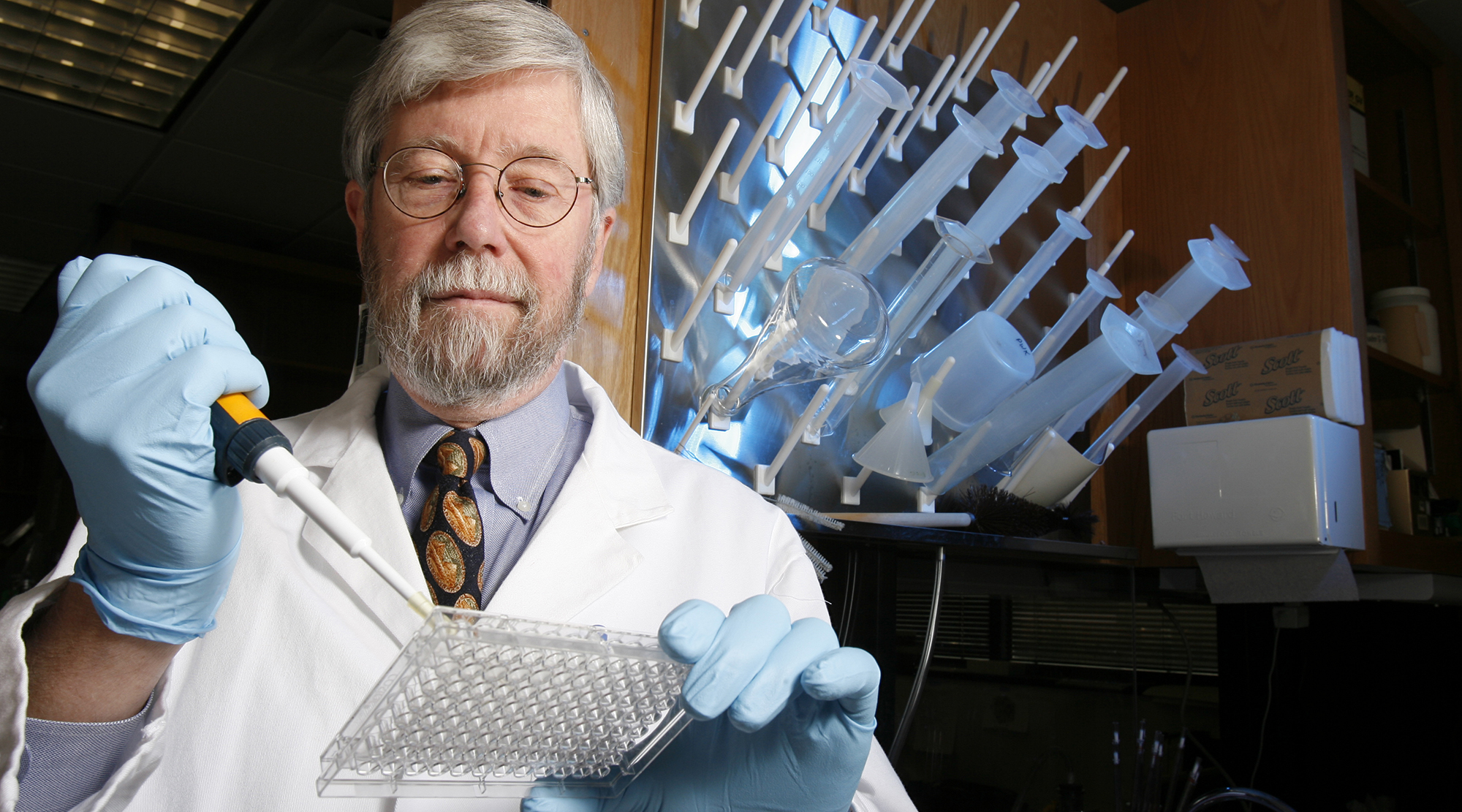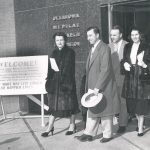Paul W. Kincade, Ph.D.
Distinguished Career Scientist
Adjunct Professor, Department of Microbiology and Immunology, University of Oklahoma Health Sciences Center
My 101
The research in my laboratory focused on the development of the immune system. That is, we were learning how highly specialized cells that we call “soldiers of the immune system” are produced. Formally called lymphocytes, these cells are produced in two types of factories: the bone marrow and thymus. Lymphocytes migrate throughout the body and work together in teams to keep us healthy. However, they eventually grow tired and must constantly be replaced. We learned that they are produced in large numbers throughout life and have discovered that many proteins and hormones such as estrogen are responsible for carefully controlling lymphocyte production. Abnormalities in this vital process result in immune deficiency diseases, autoimmunity and cancers such as leukemias and lymphomas.
We discovered new cell types that we believed had very special jobs in the immune system. Additionally, our research team found a new way the body springs into action during times of infection. We discovered that even stem cells can recognize bacterial and viral products. Stem cells in bone marrow quickly respond by producing new cells that function in what is called “innate immunity.” This represents an important new way the bone marrow can replenish our first lines of defense. On the other hand, we found new evidence that chronic infections may prematurely age the immune system. Further study should reveal how the process works and might suggest ways to protect against one kind of age-related deterioration.
Brief CV
Education
B.S., Mississippi State University, 1966
M.S., Mississippi State University, 1968
Ph.D., University of Alabama, 1971
Honors and Awards
1969-1971 National Institutes of Health Predoctoral Fellowship
1971-1972 National Institutes of Health Postdoctoral Fellowship
1972-1975 Arthritis Foundation Postdoctoral Fellowship
1975-1978 Arthritis Foundation Senior Investigatorship
1978-1983 National Institutes of Health Research Career Development Award
1989 M.E.R.I.T. Award (National Institutes of Health)
1992 William H. and Rita Bell Chair for Biomedical Research
1997-2003 Councilor, American Association of Immunologists
1998 Distinguished Service Award, American Association of Immunologists
1998-2006 Board, Federation of American Societies for Experimental Biology
1999-2004 International Union of Immunological Societies
2000-2002 Chair, FASEB Science Policy Subcommittee on Training and Careers
2002-2003 President, American Association of Immunologists
2002-2003 Chair, FASEB Science policy committee
2004-2005 President, Federation of American Societies for Experimental Biology
2004- Board of Scientific Councilors, National Institute for Child Health & Human Development
2005- Scientific Advisory Board, RIKEN Institute for Allergy & Immunology
2006 – ISI List of Highly Cited Scientists
Other Activities
Editorial boards of numerous scientific journals; faculty for courses in immunology in U.S. and abroad; ad hoc advisor to Veterans Administration, American Cancer Society, National Foundation – March of Dimes, National Science Foundation (Cellular Physiology Program), National Institutes of Health (National Cancer Institute, National Institute on Aging, and the Immunobiology Study Section); program chair, American Association of Immunologists.
Memberships
American Association of Immunologists
American Society for Investigative Pathology
International Society for Experimental Hematology
Clinical Immunology Society
American Society of Hematology
Joined OMRF Scientific Staff in 1982.
Publications
Recent Publications
Yokota T, Oritani K, Sudo T, Ishibashi T, Doi Y, Habuchi Y, Ichii M, Fukushima K, Okuzaki D, Tomizuka K, Yamawaki K, Kakitani M, Shimono A, Morii E, Kincade PW, Kanakura Y. Estrogen-inducible sFRP5 inhibits early B-lymphopoiesis in vivo, but not during pregnancy. Eur J Immunol 45:1390-401, 2015 May, PMID: 25676235
Vadillo E, Dorantes-Acosta E, Arriaga-Pizano L, Chavez-Gonzalez A, Reyes-Maldonado E, Garrett KP, Mayani H, Kincade PW, Pelayo R. Adult, but not neonatal, human lymphoid progenitors respond to TLR9 ligation by producing functional NK-like cells. Exp Hematol 42:562-73.e3, 2014 July, PMID: 24721609
Iida R, Welner RS, Zhao W, Alberola-lla J, Medina KL, Zhao ZJ, Kincade PW. Stem and progenitor cell subsets are affected by JAK2 signaling and can be monitored by flow cytometry. PLoS One 9:e93643, 2014 April, PMID: 24699465, PMCID: PMC3974768
Selected Publications
* Ichii M, Frank MB, Iozzo RV, Kincade PW. The canonical Wnt pathway shapes niches supportive for hematopoietic stem/progenitor cells. Blood 119:1683-1692, 2012. [Abstract]
Zhang Q, Iida R, Shimazu T, Kincade PW. Replenishing B lymphocytes in health and disease. Curr Opin Immunol 24:196-203, 2012. [Abstract]
Esplin BL, Shimazu T, Welner RS, Garrett KP, Nie L, Zhang Q, Humphrey MB, Yang Q, Borghesi LA, Kincade PW. Chronic exposure to a TLR Ligand injures hematopoietic stem cells. J Immunol 186:5367-5375, 2011. [Abstract]
Ichii M, Shimazu T, Welner RS, Garrett KP, Zhang Q, Esplin BL, Kincade PW. Functional diversity of stem and progenitor cells with B-lymphopoietic potential. Immunol Rev. 237:10-21, 2010. [Abstract]
Shimazu T, Iida R, Zhang Q, Welner RS, Medina KL, Alberola-Ila J, Kincade PW. CD86 is expressed on murine hematopoietic stem cells and denotes lymphopoietic potential. Blood 119:4889-4897, 2012. [Abstract]
Welner RS, Esplin BL, Garrett KP, Pelayo R, Luche H, Fehling HJ, Kincade PW. Asynchronous RAG-1 expression during B lymphopoiesis. J Immunol. 183:7768-7777, 2009. [Abstract]
Contact
Oklahoma Medical Research Foundation
825 N.E. 13th Street
Oklahoma City, OK 73104
Phone: (405) 271-7905
Fax: (405) 271-8568
E-mail: Paul-Kincade@omrf.org
For media inquiries, please contact OMRF’s Office of Public Affairs at news@omrf.org.
News from the Kincade lab

Sometimes, a little hope is all you need. And hope is what the 15 Oklahoma patients, caregivers and Muscular Dystrophy Association physicians and staff who visited OMRF Friday got when they spoke with scientists about new research and discoveries that hold hope for the treatment of amyotrophic lateral sclerosis (ALS), a form of muscular dystrophy. […]
Scientists at OMRF think they have solved a riddle that has puzzled researchers since the 1970s. For more than three decades, researchers have debated whether two types of pathogen-fighting cells—known as B1 and B2 cells—come from the same source. At long last, OMRF scientists appear to have found an answer. That work could have important […]
For many years, researchers believed that stem cells in the bone marrow spent most of their existence in a slumber-like state, unaware of—and unaffected by—the daily battles fought by the body’s immune system. Not so. Scientists at the Oklahoma Medical Research Foundation have discovered that marrow stem cells—undifferentiated cells that eventually give rise to the […]
Scientists at the Oklahoma Medical Research Foundation have identified two new categories of cells in the immune system. OMRF researchers Paul Kincade, Ph.D., and Rosana Pelayo, Ph.D., have chronicled this discovery in the June 1 issue of the journal Blood. The previously unknown types of cells, which Kincade and Pelayo have named Plasmacytoid dendritic cells […]
In a news conference this morning at the National Press Club, the Federation of American Societies for Experimental Biology (FASEB) welcomed Paul W. Kincade, Ph.D., as its 89th President. Kincade heads the Immunobiology and Cancer Research Program and holds the William H. and Rita Bell Chair of Biomedical Research at the Oklahoma Medical Research Foundation. […]
An article by Oklahoma Medical Research Foundation scientist Paul W. Kincade, Ph.D., has been selected to appear on the cover of the September 17 issue of Immunity, the leading journal in the field of immunology. Kincade’s article looks at the development of immune cells from the time when they first appear in embryos and compares […]
Oklahoma City, April 23, 2003 – At its semiannual board meeting last night, the Oklahoma Medical Research Foundation presented the Edward L. and Thelma Gaylord Prize for Scientific Achievement to OMRF scientist Paul W. Kincade, Ph.D. Also Tuesday, OMRF honored longtime director H.E. “Gene” Rainbolt, named K. Mark Coggeshall, Ph.D., as the first holder of […]
(OKLAHOMA CITY) — Scientists at the Oklahoma Medical Research Foundation (OMRF) have announced the discovery of a new interferon-like substance they named “limitin” because of its ability to limit tumor cell growth. Limitin is partially similar in structure to the type I interferons, naturally occurring proteins first discovered for their ability to curtail viral replication. […]
























